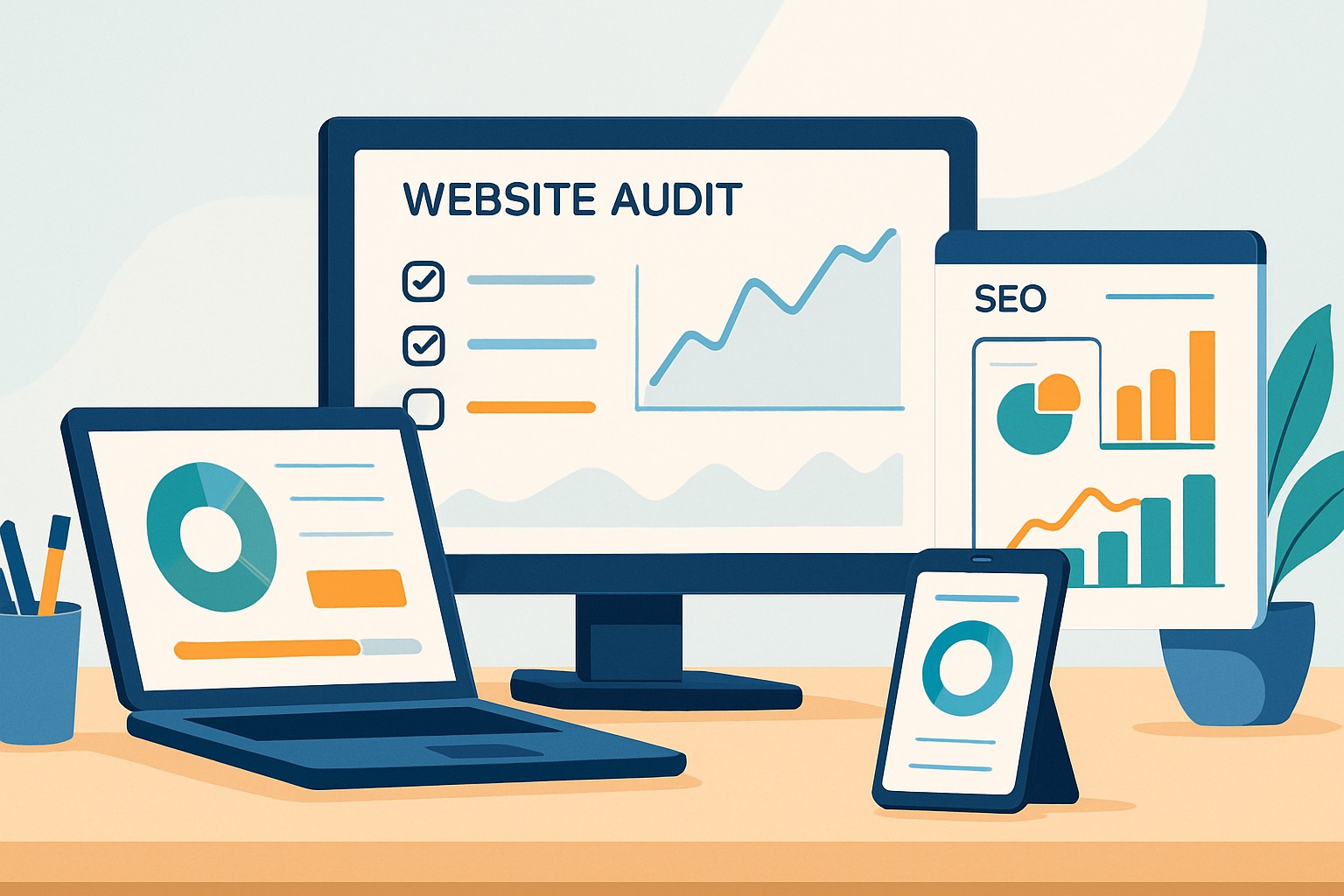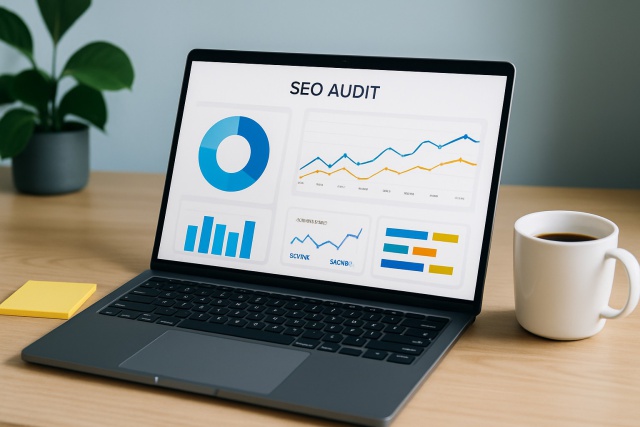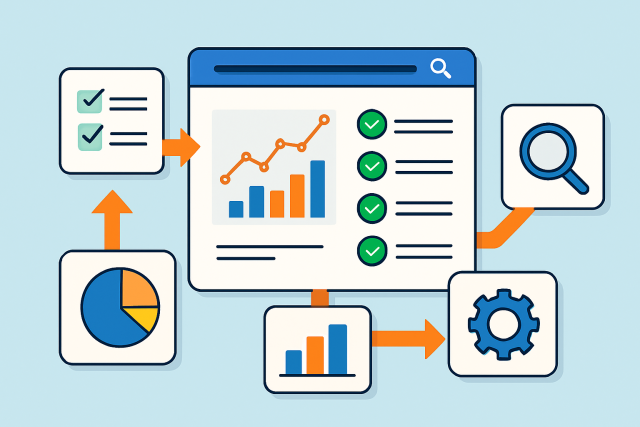What Is a Website Audit and How You Can Benefit From One?


A website audit takes a close careful look under the hood at a site's overall health, checking out everything from performance and user experience to search engine optimization (SEO) and security.
The Importance of Conducting a Website Audit
Taking the time to conduct a website audit might just be the smartest move you make for your online presence. It’s like giving your website a thorough health check—catching those sneaky issues before they snowball into bigger headaches. In my experience, a well-done audit not only spots what’s working but also uncovers what’s holding you back, often in ways you would not expect. So, if you’ve been putting off this vital step, now's the perfect moment to roll up your sleeves and dive in—your website will thank you for it.
A website audit uncovers those sneaky issues that everyday visitors might easily overlook, yet they can quietly wreak havoc on your site’s search engine ranking and overall user experience.
- Track down broken links and coding glitches that can disrupt user navigation and damage your site's credibility.
- Give your website speed a serious boost to keep visitors hooked and prevent them from clicking away.
- Fine-tune mobile usability so your site works effortlessly on smartphones and tablets because nobody likes a clunky interface.
- Pump up your SEO rankings to attract more organic traffic and stand out in the online crowd.
- Double-check that your site follows security rules to protect user data and build their trust.
- Keep an eye on content quality regularly to stay fresh and relevant in your niche.
Key Elements of a Website Audit That You Cannot Afford to Overlook
A website audit dives into several key areas to get a real sense of overall health. It tackles technical SEO to ensure search engines can crawl and index pages without a hitch. It takes a close look at content quality and checks usability and navigation so users can find what they need without pulling their hair out. It tests site speed, evaluates mobile responsiveness and assesses security measures to keep threats at bay.
Start with a technical SEO audit to sniff out pesky issues like crawlability hiccups and broken links and check if your sitemap is doing its job.
Give your content a good once-over to make sure it truly meets user intent and follows SEO best practices.
Take a stroll through the user experience and site navigation to ensure visitors don’t get lost and can find what they’re after.
Slow pages chase people away and drag down your search rankings.
Double-check mobile responsiveness so your site feels smooth and easygoing on a smartphone, tablet, or desktop.
Last but certainly not least, run security checks including SSL certification and vulnerability scans to keep your data safe and sound.
A Step-by-Step Guide to How a Website Audit Is Done
Let’s roll up our sleeves and dive into the nuts and bolts of how a website audit actually goes down. Whether you are a seasoned pro or just dipping your toes into the world of web checks, this guide walks you through each phase with a clear head and a bit of practical wisdom.
Think of a website audit as a health check-up for your site. It kicks off by gathering detailed info on every single page, kind of like a doctor digging through your medical history. Then, the experts carefully examine everything—from the site’s framework to the quality of its content—before handing over a report full of practical tips to boost your site’s overall well-being.
Crawl the website to gather all those nitty-gritty technical details—think page status codes, redirects and how pages are getting indexed.
Double-check that pages are playing nice with search engines by making sure they’re indexed properly. Take a good look at metadata like titles and descriptions to see if they’re pulling their weight.
Size up backlinks and other external factors that give your site its street cred because authority matters.
Dig into the page content and keywords to see if they’re really hitting the mark with what users are actually searching for—no point in guessing here.
Take a close look at site loading speed and how smoothly everything runs on mobile devices since nobody likes waiting around or struggling to navigate on their phone.
Hunt down errors like those pesky broken links, duplicate content that does more harm than good or any security issues that might be lurking backstage.
Wrap it all up in a handy report packed with your findings and clear prioritized suggestions so improvements don’t get lost in the shuffle.

Visual representation of the steps involved in conducting a website audit from crawling to reporting.
Handy Tools and Resources That Make Website Audits a Breeze
Website audits tend to work best when you strike a balance between free and paid tools, each bringing detailed insights into various aspects of your site's health. These tools take the headache out of complex reviews by automating the way they collect and analyze data.
- Google Search Console gives you a clear backstage pass to see how your site is indexed and how it’s holding up in search.
- Google PageSpeed Insights takes a no-nonsense look at your website’s speed and offers practical tips to make it snappier.
- Screaming Frog acts like a trusty technical detective to find errors and structural hiccups under the hood.
- SEMrush offers in-depth SEO analysis and competitive spy work for a full 360-degree view.
- Ahrefs shines at eyeballing backlinks and keeping your link profile in great shape.
- Moz Pro delivers a thorough website audit, keyword detective work and SEO tweaks in a user-friendly platform.
Common Myths Surrounding Website Audits
Let's clear the air on some of the usual misconceptions about website audits because everyone loves a good myth-busting session, right?
Many individuals tend to think website audits are only for the SEO wizards or require some kind of rocket science-level technical know-how. With today’s tools, even beginners can get their heads around audits without breaking a sweat. Then there’s this other common myth that audits are something you only do once your site goes live. In reality, keeping up with regular audits is like giving your website a steady tune-up to stay in tip-top shape over time.
- Audits often require expert-level skills, but thankfully many tools are available to help even non-experts navigate the process.
- Audits are usually a one-time task, but regular check-ins are essential to ensure your site's health doesn’t decline.
- Audits don’t focus solely on SEO rankings; they also cover usability and security.
- Fixing issues can sometimes feel expensive, so concentrating on the most important changes first can help manage costs.
- Audits aren’t a quick fix for instant traffic increases because real improvements demand patience and consistent effort.
What You Can Really Gain From a Website Audit
A website audit gives owners and marketers a clear snapshot that helps them make smarter and more informed decisions to fine-tune how their site operates and ranks on search engines. It highlights practical steps to increase user engagement, improve security and sharpen the content strategy.
- Spot and nip website problems in the bud before your visitors even get a whiff of them.
- Give your search engine rankings a nice little boost by zeroing in on the technical tweaks and content upgrades that really count.
- Make the user experience so smooth and inviting that individuals stick around longer and happily convert.
- Keep website security tight as a drum to protect visitor data and earn their trust over time.
- Steer your content strategy with clear insights about what’s hitting the mark and what’s falling flat.
- Save yourself a headache by focusing time and resources only on the changes that truly move the needle.
"> Think of a website audit as your site’s regular health check-up—catching little hiccups before they turn into big headaches and keeping your online presence running smoothly and powerfully."
Getting Started With a Do-It-Yourself Website Audit or Calling in a Pro
Whether you decide to tackle a website audit yourself or call in the pros often boils down to your budget and experience and what you are hoping to achieve. DIY audits lean on handy tools like Moz Pro or Google Search Console. These tend to be a real lifesaver for small businesses or those just dipping their toes into the water. On the flip side, professional audits offer deep-dive insights and tailored advice from experts. They are a no-brainer for larger sites that need a thorough, well-crafted game plan.
| Aspect | DIY Audit Benefits | Professional Audit Benefits |
|---|---|---|
| Cost | Usually lower upfront cost and often leans on free or low-cost tools that won’t break the bank | Comes with a higher price tag but includes expert advice worth its weight in gold |
| Expertise required | Requires a bit of learning curve, though many tools walk you through it step-by-step | Calls for specialist knowledge and more advanced methods, so it’s not exactly a walk in the park |
| Time investment | Pretty flexible and can fit snugly into your busy schedule | Generally quicker since the pros bring focused, dedicated effort to the table |
| Depth of analysis | Hits the common pain points but might miss some of the trickier, behind-the-scenes stuff | A thorough deep-dive covering technical, content, and strategy areas that really gets under the hood |
| Actionable recommendations | Provides broad guidance mostly through automated reports, which is helpful but sometimes a bit surface-level | Delivers tailored, prioritized plans based on your unique needs, so you’re not left guessing |
How to Get the Most Out of Your Website Audit (Without Pulling Your Hair Out)
Get the best bang for your buck from a website audit by setting clear specific goals about what you want to achieve. Take a good hard look at the results with a thoughtful eye. Zero in on fixes that will really move the needle and roll out changes in a neat and organized fashion.
- Start by defining clear goals before you dive into the audit—trust me, it helps keep your focus razor-sharp.
- Make it a habit to schedule audits regularly because a healthy website is like a well-tended garden and needs consistent care.
- Tackle the issues that pack the biggest punch first so you can enjoy some noticeable improvements without waiting forever.
- Use those audit reports as your trusty roadmap to guide ongoing content tweaks and SEO moves.
- Keep a close eye on changes after applying fixes since it is the best way to see what is working and fine-tune anything that’s still a bit off.
Unleash Your SEO Prowess with Semrush
Are you struggling to boost your online visibility and drive more traffic to your website? Semrush is the ultimate SEO and digital marketing tool that can take your Internet Marketing game to new heights. With its powerful suite of features, you can gain a comprehensive understanding of your market, optimize your content, and outrank your competitors.
- Uncover Profitable Keywords with Advanced Research
- Analyze Your Site's Health with Detailed Audits
- Monitor Backlinks and Stay Ahead of Competitors
- Streamline Content Creation with Insights and Trends








